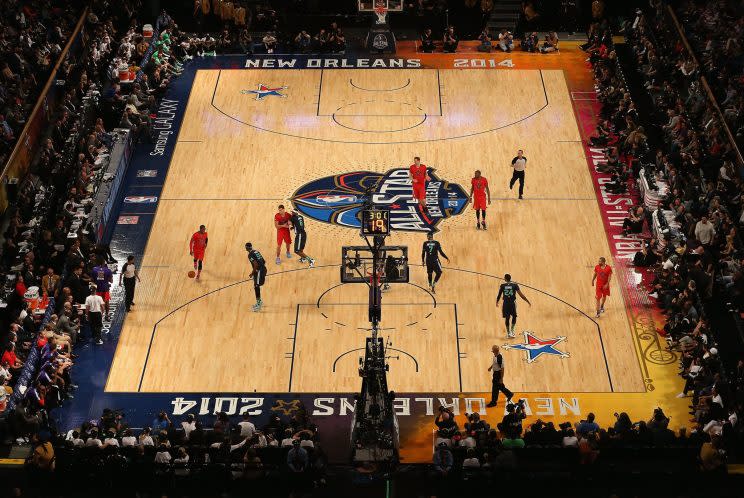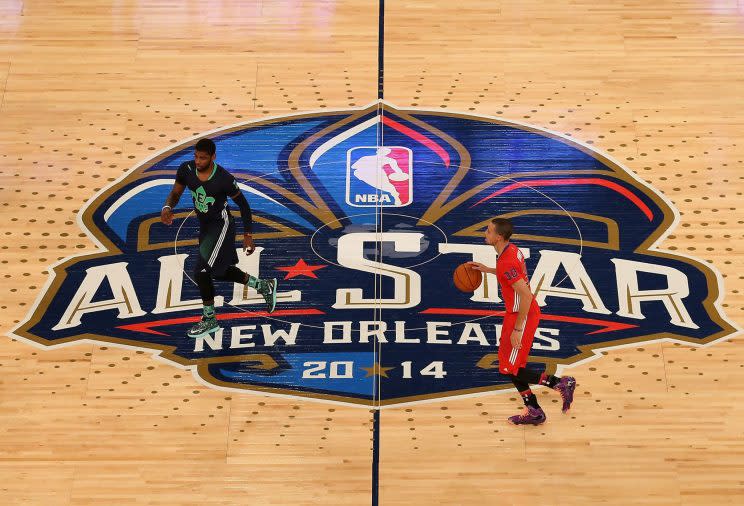How crawfish and beer saved the NBA in New Orleans
NEW ORLEANS – Six years later, no one remembers who came up with the idea that saved the NBA in New Orleans.
All they recall is that the plan was brilliant. Imaginative. Out of the box. Who would have guessed the solution for keeping the Hornets (now Pelicans) in a place that wasn’t sure it wanted them would be to host what amounted to basketball Tupperware parties? One hundred of them in fact, held in living rooms where the product sold was not storage containers but season tickets.
“It was a very New Orleans thing to do,” Matt Biggers, a former team vice president told The Vertical.
And yet it worked.
This weekend the city that loves any party is hosting the NBA All-Star Game for the second time in four years. While this week’s event is a replacement for the original host, Charlotte, the fact there are any All-Star Games in New Orleans these days is something of a miracle, because in the summer of 2011 basketball was all but dead here. Were it not for a clever idea, hatched in desperation, basketball might long be gone by now.
Of all the NBA’s comeback stories in recent years, New Orleans might be the best.
To understand this you have to realize how bad things were in June 2011. The Hornets had lost so much money since their 2007 return from a two-season post-Hurricane Katrina exile that the NBA had bought the team from owner George Shinn six months before. Commissioner David Stern hated the idea of his league abandoning the broken city and desperately wanted the Hornets to stay, but the league’s owners were frustrated with New Orleans. They wondered if basketball could really work there.
Prospective owners from other cities were circling, looking to snatch away the Hornets. The NBA was on the verge of a lockout. The league didn’t want to run the team long. They needed a local buyer and yet none seemed willing. Interest in the Hornets was low. Local fans figured the NBA was as good as gone. Something had to change fast or even Stern wouldn’t be able to keep the Hornets there.
“I was operating under the assumption that if the plan didn’t work the team would move,” Jac Sperling, the sports executive recruited by the NBA to run the Hornets, told The Vertical. “Everyone on our staff thought that, too.”
New Orleans has never been the perfect professional sports city. It is not a sprawling metropolis with millions of people and huge companies eager to buy luxury suites – things successful sports markets have in abundance. There were reasons the Hornets lost money. And while Sperling and then-team president Hugh Weber could renegotiate an arena lease and cut a better cable television deal, they faced a bigger problem.
The Hornets had sold just 6,300 season tickets the season before, a number well below the 10,000 that is considered the industry standard for franchise stability. Sperling and Weber quickly realized that after negotiating a new lease and cutting a better television deal, they had to find a way to sell 3,700 more season tickets. If they could do that they were sure the league would see New Orleans was viable and perhaps it could find a local owner.
“New Orleans is lacking Fortune 500 companies, but it does have pride,” Weber said. “If you can tap into that tapestry of what it means to be local then you have something.”
Weber, who had overseen the team’s move to Oklahoma City and back, always believed the team had a story to tell. New Orleans, he had come to realize, was a passionate place, a resilient place, a city like none he had experienced. He will never forget the elderly woman who approached him at one of the handful of games the Hornets came back to New Orleans to play during the Oklahoma seasons. She had lost her home in Katrina and spent the previous year sleeping in her car and yet she kept her Hornets tickets.
“Coming to the games reminds me that we can be normal again,” she said.
If the Hornets couldn’t sell basketball they could at least sell why they mattered to New Orleans.
They came up with a slogan: “I’m in.” As in, I’m in for New Orleans. They filmed TV ads and asked local celebrities ranging from the archbishop to the mayor to pose for pictures on billboards. But they needed something more personal than a commercial, something intimate, a way for Sperling to tell of growing up in New Orleans and Weber to speak of the woman sleeping in her car craving the normalcy of a basketball game.
That’s when they thought of the house parties. The concept of sales events are not new in sports. They are usually called “influencers” and have proven effective at creating a bond between team executives and potential season-ticket buyers. Often teams hold these in sterile settings like hotel meeting rooms. But what if instead of meeting rooms the Hornets held influencers at people’s homes?
“The idea was to get into people’s homes face-to-face and convince them that the team was going to stay,” Sperling said.
He imagined people gathered on a big New Orleans porch, drinks in hand, talking about the city. It was perfect, he thought. Someone suggested holding 100 parties on 100 nights, a round number they thought would generate enthusiasm. Everyone agreed that sounded right. With a lockout coming it wasn’t like they had anything else to do.
The Hornets announced the parties on June 15, 2011, and quickly people signed up. The mayor at the time, Mitch Landrieu, hosted a party as did Ron Forman, the head of the Audubon Natural Institute. Others followed. Sometimes the gatherings were in elegant antebellum mansions, others in tiny apartments. Once Weber showed up carrying a box of pizza to a group of college students.
“One night you would be in someone’s house that cost $5 million and the next night in someone’s house that cost $30,000,” Weber said. “A lot of times it was just crawfish in newspaper and beer,” he said.
Forman hosted party No. 34 at his home in the Uptown neighborhood. The New Orleans Times-Picayune described “a bountiful buffet table [and] an open bar nearby.” The paper also reported that before the party even began the team had sold four season tickets to someone who couldn’t attend.
“What I remember is the clear message [from team executives] that this our team and the importance of the community to get behind it,” Forman said. “I thought we needed to show the importance that sports plays in our community. It’s good for business and it’s good for the community. I’m sure there was a larger goal of getting support for the team.”
Forman can’t remember how many people bought season tickets that night, but Hornets officials recall their best events usually generated about 25 deposits for packages. Those who attended usually knew why they were there. They came with checkbooks, ready to sign.
“It was like a political campaign,” Sperling said. “It was a referendum to basically get to 10,000 season tickets,” Sperling said. “It was basically a thumbs-up or a thumbs-down for the city’s future.”
Sperling and Weber stood in front of arena seating diagrams. They said the team wanted to be more than a handful of basketball players running up and down the floor in an arena next to the Superdome. They said that much like the city they were building something, too. They said Stern believed in New Orleans and that the commissioner wanted the team to be as much a part of the city as the NFL’s Saints or the other civic institutions.
And people bought in. By mid-July, the Hornets had sold 8,500 season tickets. In August they were closing in on 9,000. On the 100th night in September that number was up to 9,003, meaning that in a little more than three months they had sold 2,700 season tickets – in the middle of a lockout.
Though the Hornets were still 997 tickets short of their goal, they had done something that seemed impossible just weeks before: They had made themselves relevant. People were talking about the parties, the newspapers had written about them, TV news mentioned them. Team employees had “10,000” scrawled on boards in their office.
“It gave us momentum,” Sperling said.
Season ticket orders kept coming.
Finally, on Dec. 8, the day the lockout ended, the team and Landrieu held a news conference to say the Hornets had sold 10,019 season tickets. A goal that once seemed impossible had been met.
“The city of New Orleans came together and sent a message to the NBA that we’re in,” Landrieu said that afternoon.
Four months later the league found the local buyer it feared would never come. With the franchise stable again, Saints owner Tom Benson bought the team from the NBA for $338 million, signing a lease to keep it in New Orleans through 2024. Sperling, Weber and Biggers, who would leave after the new ownership took over, nonetheless sighed with relief.
“If the franchise had left it would have been a black mark on the city,” Biggers said.
Benson has given the team a new name and a new identity. The team has adopted Louisiana’s deteriorating wetlands as a cause. The team is very much New Orleans now. All because of an idea, one imagined when all had failed in a city still broken.
An idea that fixed New Orleans basketball in just 100 nights.
More on Yahoo Sports:
• UFC champ Conor McGregor takes on President Trump protesters
• Tennis star Bouchard pays off blind date bet at NBA game
• What to make of the latest Tiger Woods drama



